2021-2022学年人教版(新目标)英语八年级上册Unit 2 How often do you exercise?Section B (1a-2e)课件 (共55张PPT)
文档属性
| 名称 | 2021-2022学年人教版(新目标)英语八年级上册Unit 2 How often do you exercise?Section B (1a-2e)课件 (共55张PPT) |
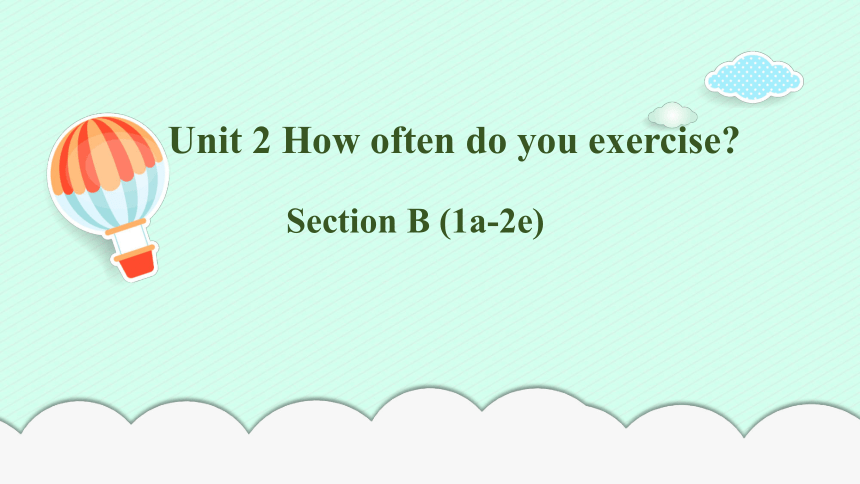
|
|
| 格式 | pptx | ||
| 文件大小 | 10.2MB | ||
| 资源类型 | 教案 | ||
| 版本资源 | 人教新目标(Go for it)版 | ||
| 科目 | 英语 | ||
| 更新时间 | 2021-08-21 00:00:00 | ||
图片预览

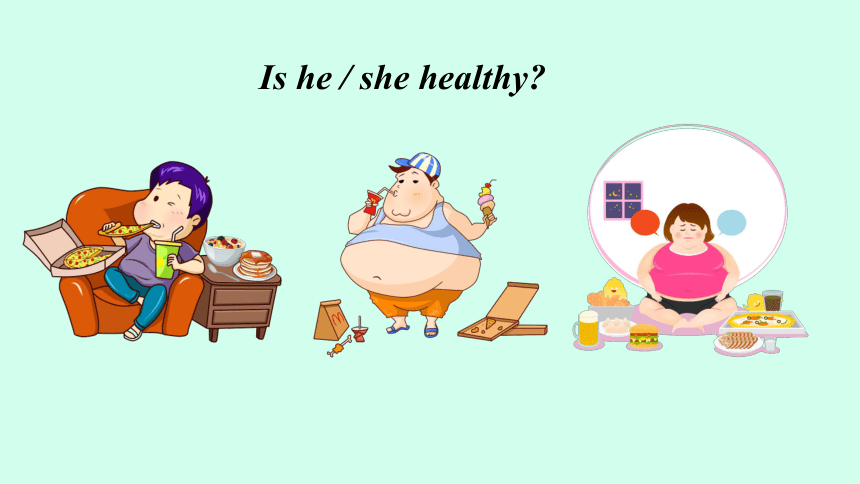
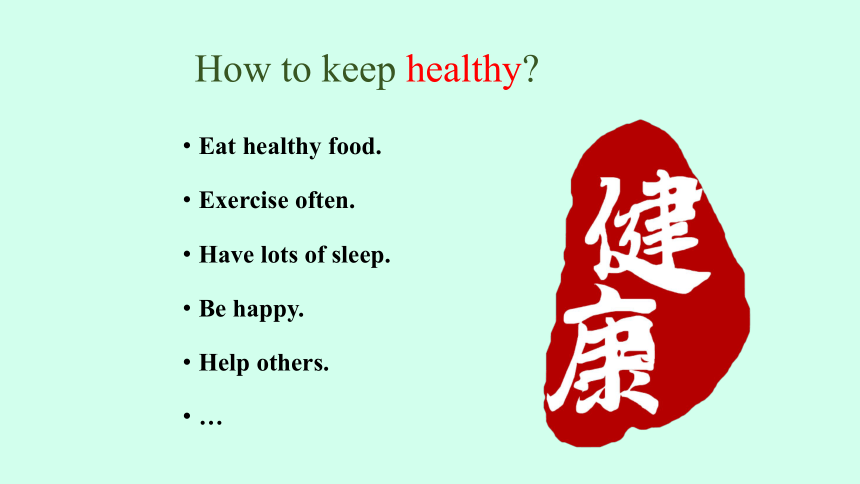
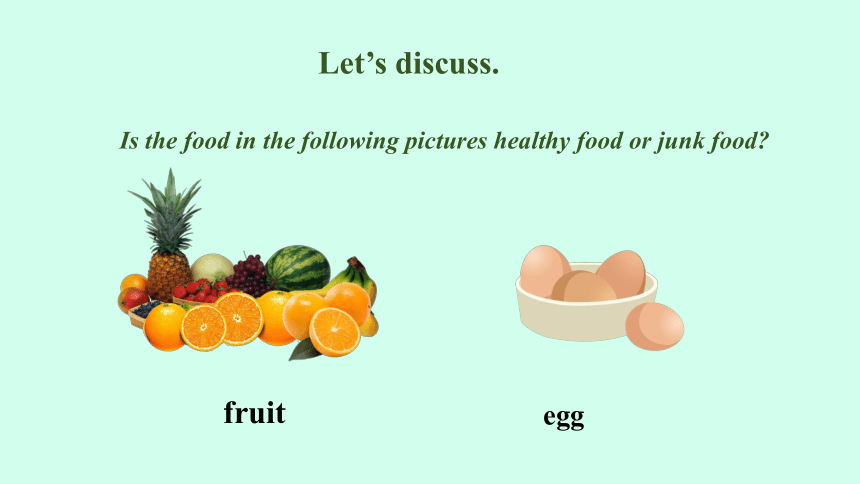
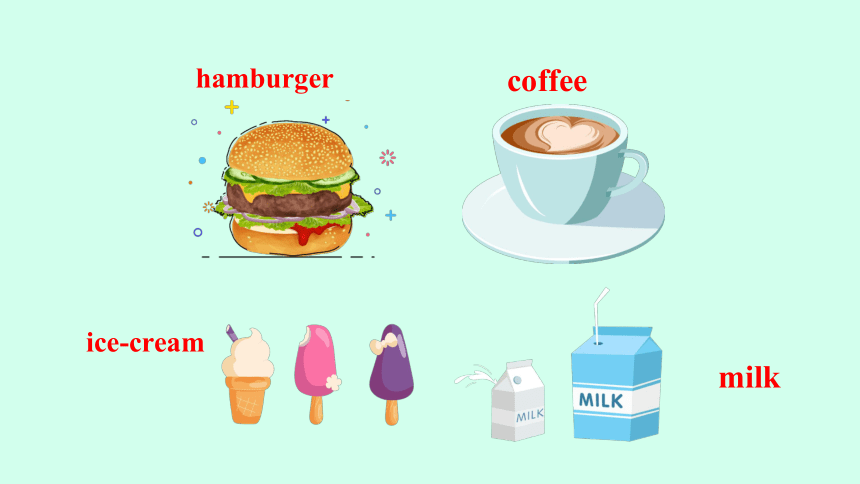

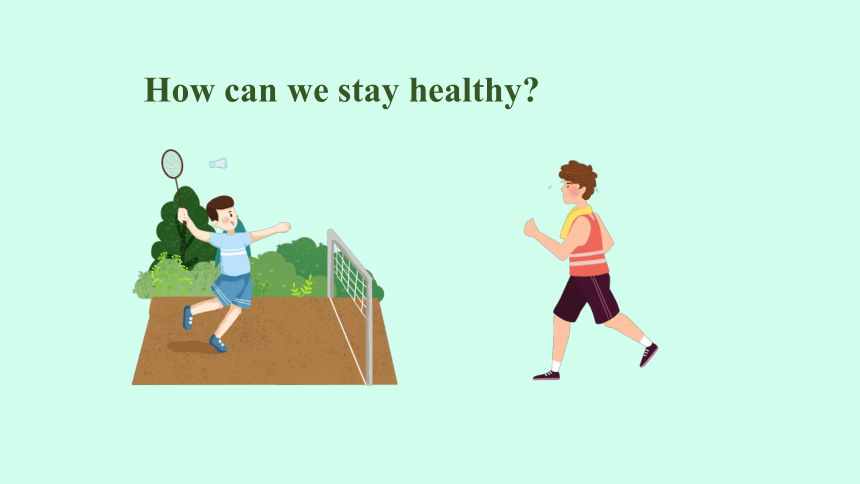
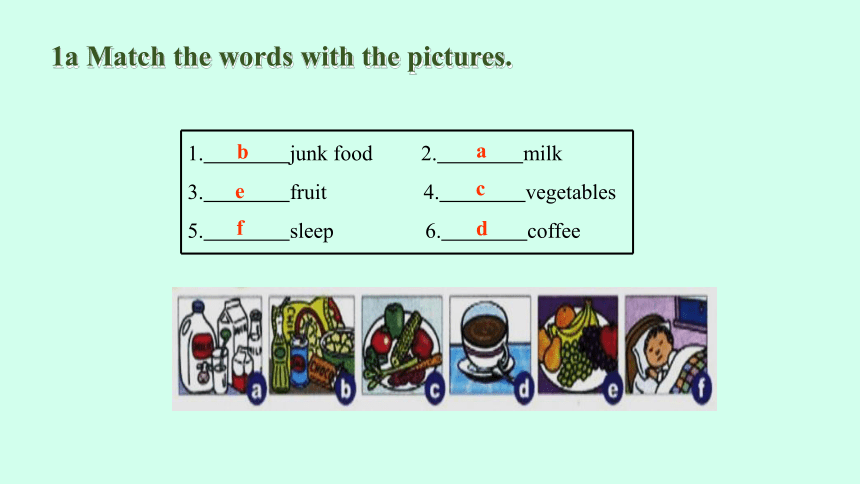
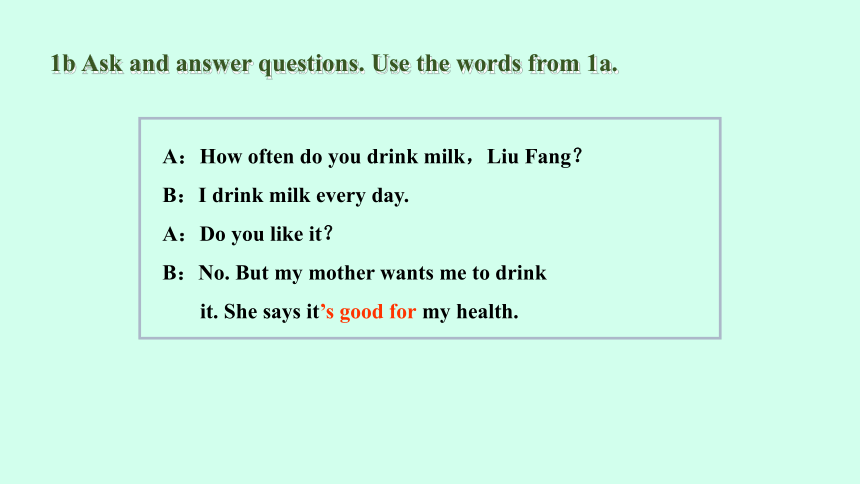
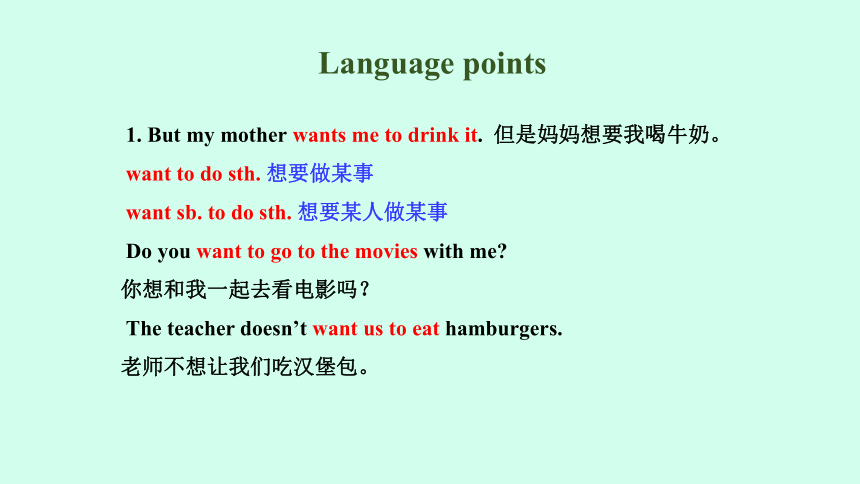
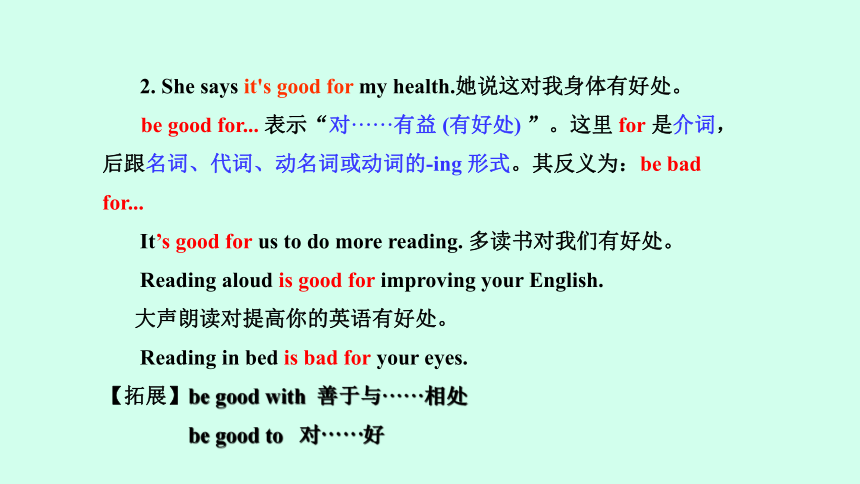

文档简介
(共55张PPT)
Unit
2
How
often
do
you
exercise?
Section
B
(1a-2e)
Is
he
/
she
healthy?
How
to
keep
healthy?
Eat
healthy
food.
Exercise
often.
Have
lots
of
sleep.
Be
happy.
Help
others.
…
Is
the
food
in
the
following
pictures
healthy
food
or
junk
food?
fruit
egg
Let’s
discuss.
milk
coffee
hamburger
ice-cream
How
can
we
stay
healthy?
How
can
we
stay
healthy?
1a
Match
the
words
with
the
pictures.
1. junk
food
2. milk
3. fruit
4. vegetables
5. sleep
6. coffee
b
a
e
c
f
d
1b
Ask
and
answer
questions.
Use
the
words
from
1a.
A:How
often
do
you
drink
milk,Liu
Fang?
B:I
drink
milk
every
day.
A:Do
you
like
it?
B:No.
But
my
mother
wants
me
to
drink
it.
She
says
it’s
good
for
my
health.
1.
But
my
mother
wants
me
to
drink
it.?
但是妈妈想要我喝牛奶。
want
to
do
sth.
想要做某事
want
sb.
to
do
sth.
想要某人做某事
Do
you
want
to
go
to
the
movies
with
me?
你想和我一起去看电影吗?
The
teacher
doesn’t
want
us
to
eat
hamburgers.
老师不想让我们吃汉堡包。
Language
points
2.
She
says
it's
good
for
my
health.她说这对我身体有好处。
be
good
for...
表示“对······有益
(有好处)
”。这里
for
是介词,后跟名词、代词、动名词或动词的-ing
形式。其反义为:be
bad
for...
It’s
good
for
us
to
do
more
reading.
多读书对我们有好处。
Reading
aloud
is
good
for
improving
your
English.
大声朗读对提高你的英语有好处。
Reading
in
bed
is
bad
for
your
eyes.
【拓展】be
good
with
善于与······相处
be
good
to
对······好
Make
your
own
conversation.
How
often
do
you
eat
hamburgers?
I
eat
hamburgers
once
a
week.
Do
you
like
it?
Yes.
But
my
mother
doesn’t
let
me
to
eat
it.
She
says
it’s
bad
for
my
health.
How
often
do
you
eat
/
drink…?
I
eat
/
drink…
Do
you
like
it?
Yes.
/
No.
…
1c
Listen
to
an
interview
about
two
people's
daily
habits.
Circle
your
answer
to
each
question.
Does
Tina
have
good
habits?
Yes.
No.
I
don't
know.
Does
Bill
have
good
habits?
Yes.
No.
I
don't
know.
1d
Listen
again.
Fill
in
the
blanks
in
the
survey.
Questions
Tina
Bill
1.How
often
do
you
exercise?
every
day
__________
2.How
often
do
you
eat
fruit?
________
_______
3.How
many
hours
do
you
sleep
_______
_______
every
night?
hardly
ever
every
day
never
nine
nine
Questions
Tina
Bill
4.How
often
do
you
drink
milk?
________
______
5.How
often
do
you
eat
junk
food?
__________
___________
6.How
often
do
you
drink
coffee?
_______
______________
every
day
never
two?or?three?
times?a?week
three?or?four?
times?a?week
never
four?times?a?day
Conversation
Interviewer:?Hi,?Tina?and?Bill.?Let’s?start?with?the?first?question.?
How?often?do?you?exercise???
Tina:?Every?day.?
Bill:?Hardly?ever.?
Interviewer:?How?often?do?you?eat?vegetables?and??fruit???
Tina:?I?eat?vegetables?and?fruit?every?day.?
Bill:?I?sometimes?eat?vegetables.?But?I?never?eat?fruit.?
Interviewer:?OK.?How?many?hours?do?you?sleep?every?night??
1c、
1d听力材料
Tina:?Nine.?
Bill:?Me,?too.?
Interviewer:?How?often?do?you?drink?milk???
Bill:?Never.?I?can’t?stand?milk.?
Tina:?Oh,?I?love?milk—I?drink?it?every?day
Interviewer:?How?often?do?you?eat?junk?food???
Bill:?I?eat?it?three?or?four?times?a?week.?
Tina:?I?guess?I?eat?it?two?or?three?times?a?week.
Interviewer:?And?how?often?do?you?drink?coffee???
Bill:?Oh,?I?drink?coffee?four?times?a?day.?
Tina:?I?never?drink?coffee.?
Interviewer:?Well,?thank?you?very?much.?
Bill/Tina:?You’re?welcome.?
1e
Student
A
is
the
reporter.
Student
B
is
Tina
or
Bill.
Ask
and
answer
questions.
Then
change
roles.
A:How
often
do
you
exercise?
B:I
exercise
every
day.
A:And
how
often
do
you...?
What
do
you
do
in
your
free
time?
Do
exercise,
surf
the
Internet
or
watch
TV?
What
activities
do
you
think
is
healthy
for
the
mind
and
the
body?
2a
Rank
these
activities
according
to
how
often
you
think
your
classmates
do
them
(1=most
often,
6=
least
often).
watch
TV
go
to
the
movies
play
computer
games
exercise
or
play
sports
use
the
Internet
go
camping
in
the
country
2b
Read
the
article
and
complete
the
pie
charts
on
the
next
page.
What
Do
No.5
High
School
Students
Do
in
Their
Free
Time?
Last
month
we
asked
our
students
about
their
free
time
activities.
Our
questions
were
about
exercise,
use
of
the
Internet
and
watching
TV.
Here
are
the
results.
We
found
that
only
fifteen
percent
of
our
students
exercise
every
day.
Forty-five
percent
exercise
four
to
six
times
a
week.
Twenty
percent
exercise
only
one
to
three
times
a
week.
And
twenty
percent
do
not
exercise
at
all!
We
all
know
that
many
students
often
go
online,
but
we
were
surprised
that
ninety
percent
of
them
use
the
Internet
every
day.
The
other
ten
percent
use
it
at
least
three
or
four
times
a
week.
Most
students
use
it
for
fun
and
not
for
homework.
The
answers
to
our
questions
about
watching
television
were
also
interesting.
Only
two
percent
of
the
students
watch
TV
one
to
three
times
a
week.
Thirteen
percent
watch
TV
four
to
six
times
a
week.
And
eighty-five
percent
watch
TV
every
day!
Although
many
students
like
to
watch
sports,
game
shows
are
the
most
popular.
It
is
good
to
relax
by
using
the
Internet
or
watching
game
shows,
but
we
think
the
best
way
to
relax
is
through
exercise.
It
is
healthy
for
the
mind
and
the
body.
Exercise
such
as
playing
sports
is
fun,
and
you
can
spend
time
with
your
friends
and
family
as
you
play
together.
And
remember,
“Old
habits
die
hard.”
So
start
exercising
before
it’s
too
late!
Read
the
passage
carefully
and
complete
the
pie
chart
below.
15
10
20
20
45
90
13
2
85
Here
are
the
results.这是调查结果。
是倒装句,正常语序是The
results
are
here.。
e.g.
Here
is
my
book.这是我的书。
以here,there,out,up,down等副词开头的句子常用倒装结构。当主语为名词时,句子结构为:副词+谓语动词+主语(名词);当主语为代词时,句子不倒装,其结构为:副词+主语(代词)+谓语动词。
e.g.
Here
comes
the
bus.公共汽车来了。
Here
he
comes.他来了。
Language
points
result意为“结果;后果”,the
result(s)
of...意为“……的结果”
e.g.
The
result
of
the
examination
was
quite
unexpected.
考试的结果完全出乎意料。
as
a
result是一个习惯短语,意为“因此,结果”。
e.g.
He
didn't
practice,
and
as
a
result
he
lost.
他没有练习,结果输了。
Language
points
percent
/p?’sent
/
n.百分之……
percent单复数同形。与数词连用时,数词应置于percent之前。
e.g.
twenty
percent
百分之二十
percent
of后接名词作主语时,of后的名词如果为不可数名词或单数可数名词,谓语动词用单数形式;若为可数名词复数形式,则谓语动词用复数形式。
e.g.
65
percent
of
the
children
play
computer
games.
百分之六十五的孩子玩电脑游戏。
Language
points
surprised
/s?’pra?zd
/
adj.惊奇的;惊讶的
【辨析】surprised与surprising
e.g.
We
are
much
surprised
to
hear
the
news.
听到这个消息,我们非常诧异。
Language
points
surprised意为“惊奇的;惊讶的”,常修饰人。
I
was
surprised
when
I
heard
the
news.
当我听到这个消息时,我感到惊讶。
be
surprised
at...对……感到惊讶
e.g.
I
was
surprised
at
his
answer.
我对他的回答感到惊讶。
surprising
意为“使人吃惊的”,常修饰事物。
Your
success
is
surprising.你的成功令人吃惊。
Language
points
Although
many
students
like
to
watch
sports,
game
shows
are
the
most
popular.虽然很多学生喜欢看体育节目,但游戏节目是最受欢迎的。
although是连词,意为“虽然,即使,纵然”,引导让步状语从句,相当于though,大多数情况下两者可互换。
Language
points
---You
bought
the
car
about
ten
years
ago?
---Yes.
_______
it's
old,
it
still
runs
well.
A.
Because
B.
Since
C.
Although
D.
But
Although
I
am
tired,
I
must
go
on
working.
尽管我很累,我还是要继续工作。
C
Language
points
...,but
we
think
the
best
way
to
relax
is
through
exercise.
但我认为最好的放松方式是通过锻炼。
(1)way意为“(做某事)的方法、方式、手段”。
Another
way
of
making
new
friends
is
to
go
to
an
evening
class.
另一种交新朋友的方法就是去
夜校。
(2)through是介词,有“在······之中,透过,通过”的意思。
He
got
the
job
through
his
uncle.
他通过他的叔叔得到了工作。
Language
points
Exercise
such
as
playing
sports
is
fun...
锻炼像做运动这样是很有趣的······
such
as
用来举例,意为“例如;诸如此类的;像······那样的”,相当于like或for
example。
Animals
such
as
rabbits
and
deer
continue
to
be
active
all
winter,
finding
food
wherever
they
can.
像兔子和鹿这类动物依然活跃在整个冬季,在任何它们可以找到食物的地方。
It
is
good
to
relax
by
using
the
Internet
or
watching
game
shows,but
we
think
the
best
way
to
relax
is
through
exercise.
通过使用网络或观看游戏类节目放松是好的,但我们认为通过锻炼的方式放松是最好的。
本句是由but连接的并列复合句。前一个分句中,It是形式主语,真正的主语是动词不定式短语to
relax
by
using
the
Internet
or
watching
game
shows。该句型结构为It
is+adj.(+for
sb.)
to
do
sth.
e.g.
It
is
easy
for
me
to
play
ping?pong.
打乒乓球对我来说是容易的。
Language
points
It
is
important
people
good
manners.
A.
for;
to
learn
B.
of;
to
learn
C.
for;
learn
D.
of;
learn
A
Language
points
by为介词,意为“通过;靠”,此处表示方法、手段,后接名词、代词或动词的?ing形式。
e.g.
He
has
to
do
all
the
work
by
hand.
所有的工作他都要靠手工完成。
You
can
practice
soccer
by
joining
a
sports
club.
你可以通过加入一个运动俱乐部来练习足球。
Language
points
(1)by+交通工具(by后不加冠词),意为“乘/驾/……”。
e.g.
I
go
to
work
by
bike
every
day.
我每天骑自行车上班。
(2)by+时间,意为“到……时(为止);
在……以前”,by
now到目前为止。
e.g.
I
must
go
to
bed
by
ten
o'clock.我必须在10点之前上床睡觉。
You
should
know
the
truth
by
now.现在你应该知道真相了。
(3)by+地点,意为“在……旁边”。
e.g.
We
live
by
the
sea.
我们住在海边。
Language
points
through
/θru:
/prep.以,凭借,穿过
through与across
Language
points
through
穿过,表示从……中通过,着重指从内部空间的一头纵穿到另一头。
The
burglar
came
in
through
the
window.
盗贼是从窗户进来的
across
穿过,表示从一物体表面的一边到另一边。
We
walked
across
the
bridge.
我们从桥上走过。
mind
/ma?nd
/
n.头脑;心智
e.g.
He
is
ninety
years
old,but
his
mind
is
sharp.
他虽然90岁了,但头脑很灵活。
mind作名词,可构成短语:change
one's
mind
改变主意;
make
up
one's
mind
下决心。
e.g.
I
think
nothing
can
change
his
mind.
我认为没什么可以改变他的主意。
Language
points
mind
用作动词,意为“介意”。常用句型“Would
you
mind
(one's)doing
sth.?”意为“你介意(某人)做某事吗?”。
e.g.Would
you
mind
(my)
opening
the
door?
你介意(我)打开门吗?
Language
points
—It's
too
cold
today.
Would
you
mind the
window?
—Certainly
not.
Go
ahead.
to
close
B.
closing
C.
close
D.
closed
B
such
as
例如;像……这样
【辨析】such
as与like
Language
points
such
as用来列举同类人或事物中的几个例子。
e.g.
Boys
such
as
John
and
James
are
very
friendly.
像约翰和詹姆斯这样的男孩都很友好。
like与such
as可互换。但若such
as分开使用,则不可互换。
e.g.
He
knows
many
languages,like
English
and
Chinese.
他会多门语言,例如英语和汉语。
such
as
后面可跟名词、代词或动名词。
e.g.
I
like
drinks
such
as
cola
and
pop.
我喜欢诸如可乐和汽水之类的饮料。
He
knows
five
languages
English
and
Japanese.
A.
are
like B.
such
as
C.
such
like
D.
as
such
B
Language
points
die
/da?/
v.消失;灭亡;死亡
【辨析】die
of与die
from
e.g.
His
grandfather
died
last
winter.
去年冬天他祖父去世了。
Language
points
die
of
表示“死于……”,多用于内因
Many
people
die
of
cancer.很多人死于癌症。
die
from
表示“死于……”,多用于外因
Tom’s
uncle
died
from
an
earthquake.汤姆的叔叔死于一场地震。
die
的各种形式
die
v.
dead
adj.死了的
death
n.
死
died
died
dying
adj.
快要死的
e.g.
The
tree
has
been
dead
for
a
month.
这棵树死了一个月了。
The
death
of
his
pet
cat
made
him
very
sad.
他的宠物猫的死让他很伤心。
Language
points
2c
Read
the
article
again
and
answer
the
questions.
1.How
many
percent
of
the
students
do
not
exercise
at
all?
2.How
many
percent
of
the
students
use
the
Internet
every
day?
3.How
often
do
most
students
watch
TV?
What
do
they
usually
watch?
Twenty
percent
of
them
do
not
exercise
at
all.
Ninety
percent
of
them
use
the
Internet
every
day.
Most
students
watch
TV
every
day
They
usually
watch
sports
and
game
shows.
4.What
does
the
writer
think
is
the
best
way
to
relax?
Why?
5.Do
you
think
the
students
at
No.5
are
healthy?
Why
or
why
not?
The
writer
thinks
the
best
way
to
relax
is
through
exercise.
Because
it's
healthy
for
the
mind
and
the
body.
I
don’t
think
they
are
very
healthy,because
they
always
use
the
Internet
and
watch
TV,but
only
sometimes
exercise.
2d
According
to
the
article
and
the
pie
charts,write
sentences
with
the
percentages
using
always,usually
or
sometimes.
1.90%:Ninety
percent
of
the
students
always
use
the
Internet.
2.85%______________________________________
_____________
3.45%______________________________________
________________
Eighty?five
percent
of
the
students
always
watch
TV.
Forty?five
percent
of
the
students
usually
exercise.
4.10%:___________________________________
____________________
5.13%:___________________________________
_____________________
6.2%:_____________________________________
____________________
Ten
percent
of
the
students
sometimes
use
the
Internet.
Thirteen
percent
of
the
students
usually
watch
TV.
Two
percent
of
the
students
sometimes
watch
TV.
2e
Choose
one
of
these
free
time
activities
or
think
of
your
own.
Then
ask
your
classmates
how
often
they
do
this
activity
and
make
a
pie
chart.
Show
the
pie
chart
to
your
class.
How
often
do
you
play
sports?
1-3
times
a
week.
play
computer
games
read
books
go
shopping
draw
pictures
play
sports
How
often
do
you...?
Names
of
classmates
1-3
times
a
week
4-6
times
a
week
every
day
Exercises
一、根据句意及汉语提示写单词。
1.
The
river
runs
_______(穿过)
the
city.
2.
This
is
_____(这样的)
a
beautiful
garden.
I
love
it
very
much.
3.
—A
year
later,
my
dog
_____(死亡).
—I'm
sorry
to
hear
that.
4.
I
don't
want
to
go
there
myself.
Let's
go________
(一起).
5.
Reading
a
lot
can
open
your
_______(心智).
through
such
died
together
mind
二、根据汉语意思完成句子。
1.她很少一个人出去。
She
______
______
goes
out
alone.
2.
——你的妈妈多长时间回家一次?
——一月三、四次。
—_____
_____
does
your
mother
go
home?
—______
_____
_____
______
a
month.
3.
老师不想让我们吃汉堡包。
The
teacher________
______
___
__
_____
hamburgers.
hardly
ever
How
often
Three
or
four
times
doesn’t
want
us
to
eat
Exercises
4.
多吃蔬菜对你的健康有好处。
Eating
more
vegetables
____
_____
_____
_____
_____.
5.
妈妈让我每天都喝水。
My
mother
wants
_______
______
______
______
every
day.
6.
我们可以通过上网来放松。
We
can
_________________the
Internet.
7.
积习难改。
Old
____________hard.
is
good
for
your
health
me
to
drink
water
Exercises
relax
by
using
habits
die
8.
运动很有趣,比如参加体育运动。
Exercise
______________sports
is
fun.
9.
它有利于我的身心健康。
It's
_____
for
my
_____
and
______.
10.
他的宠物狗和猫是一起死的。
His
pet
dog
and
cat____________.
such
as
playing
good
body
mind
die
together
Exercises
Bye-bye!
Unit
2
How
often
do
you
exercise?
Section
B
(1a-2e)
Is
he
/
she
healthy?
How
to
keep
healthy?
Eat
healthy
food.
Exercise
often.
Have
lots
of
sleep.
Be
happy.
Help
others.
…
Is
the
food
in
the
following
pictures
healthy
food
or
junk
food?
fruit
egg
Let’s
discuss.
milk
coffee
hamburger
ice-cream
How
can
we
stay
healthy?
How
can
we
stay
healthy?
1a
Match
the
words
with
the
pictures.
1. junk
food
2. milk
3. fruit
4. vegetables
5. sleep
6. coffee
b
a
e
c
f
d
1b
Ask
and
answer
questions.
Use
the
words
from
1a.
A:How
often
do
you
drink
milk,Liu
Fang?
B:I
drink
milk
every
day.
A:Do
you
like
it?
B:No.
But
my
mother
wants
me
to
drink
it.
She
says
it’s
good
for
my
health.
1.
But
my
mother
wants
me
to
drink
it.?
但是妈妈想要我喝牛奶。
want
to
do
sth.
想要做某事
want
sb.
to
do
sth.
想要某人做某事
Do
you
want
to
go
to
the
movies
with
me?
你想和我一起去看电影吗?
The
teacher
doesn’t
want
us
to
eat
hamburgers.
老师不想让我们吃汉堡包。
Language
points
2.
She
says
it's
good
for
my
health.她说这对我身体有好处。
be
good
for...
表示“对······有益
(有好处)
”。这里
for
是介词,后跟名词、代词、动名词或动词的-ing
形式。其反义为:be
bad
for...
It’s
good
for
us
to
do
more
reading.
多读书对我们有好处。
Reading
aloud
is
good
for
improving
your
English.
大声朗读对提高你的英语有好处。
Reading
in
bed
is
bad
for
your
eyes.
【拓展】be
good
with
善于与······相处
be
good
to
对······好
Make
your
own
conversation.
How
often
do
you
eat
hamburgers?
I
eat
hamburgers
once
a
week.
Do
you
like
it?
Yes.
But
my
mother
doesn’t
let
me
to
eat
it.
She
says
it’s
bad
for
my
health.
How
often
do
you
eat
/
drink…?
I
eat
/
drink…
Do
you
like
it?
Yes.
/
No.
…
1c
Listen
to
an
interview
about
two
people's
daily
habits.
Circle
your
answer
to
each
question.
Does
Tina
have
good
habits?
Yes.
No.
I
don't
know.
Does
Bill
have
good
habits?
Yes.
No.
I
don't
know.
1d
Listen
again.
Fill
in
the
blanks
in
the
survey.
Questions
Tina
Bill
1.How
often
do
you
exercise?
every
day
__________
2.How
often
do
you
eat
fruit?
________
_______
3.How
many
hours
do
you
sleep
_______
_______
every
night?
hardly
ever
every
day
never
nine
nine
Questions
Tina
Bill
4.How
often
do
you
drink
milk?
________
______
5.How
often
do
you
eat
junk
food?
__________
___________
6.How
often
do
you
drink
coffee?
_______
______________
every
day
never
two?or?three?
times?a?week
three?or?four?
times?a?week
never
four?times?a?day
Conversation
Interviewer:?Hi,?Tina?and?Bill.?Let’s?start?with?the?first?question.?
How?often?do?you?exercise???
Tina:?Every?day.?
Bill:?Hardly?ever.?
Interviewer:?How?often?do?you?eat?vegetables?and??fruit???
Tina:?I?eat?vegetables?and?fruit?every?day.?
Bill:?I?sometimes?eat?vegetables.?But?I?never?eat?fruit.?
Interviewer:?OK.?How?many?hours?do?you?sleep?every?night??
1c、
1d听力材料
Tina:?Nine.?
Bill:?Me,?too.?
Interviewer:?How?often?do?you?drink?milk???
Bill:?Never.?I?can’t?stand?milk.?
Tina:?Oh,?I?love?milk—I?drink?it?every?day
Interviewer:?How?often?do?you?eat?junk?food???
Bill:?I?eat?it?three?or?four?times?a?week.?
Tina:?I?guess?I?eat?it?two?or?three?times?a?week.
Interviewer:?And?how?often?do?you?drink?coffee???
Bill:?Oh,?I?drink?coffee?four?times?a?day.?
Tina:?I?never?drink?coffee.?
Interviewer:?Well,?thank?you?very?much.?
Bill/Tina:?You’re?welcome.?
1e
Student
A
is
the
reporter.
Student
B
is
Tina
or
Bill.
Ask
and
answer
questions.
Then
change
roles.
A:How
often
do
you
exercise?
B:I
exercise
every
day.
A:And
how
often
do
you...?
What
do
you
do
in
your
free
time?
Do
exercise,
surf
the
Internet
or
watch
TV?
What
activities
do
you
think
is
healthy
for
the
mind
and
the
body?
2a
Rank
these
activities
according
to
how
often
you
think
your
classmates
do
them
(1=most
often,
6=
least
often).
watch
TV
go
to
the
movies
play
computer
games
exercise
or
play
sports
use
the
Internet
go
camping
in
the
country
2b
Read
the
article
and
complete
the
pie
charts
on
the
next
page.
What
Do
No.5
High
School
Students
Do
in
Their
Free
Time?
Last
month
we
asked
our
students
about
their
free
time
activities.
Our
questions
were
about
exercise,
use
of
the
Internet
and
watching
TV.
Here
are
the
results.
We
found
that
only
fifteen
percent
of
our
students
exercise
every
day.
Forty-five
percent
exercise
four
to
six
times
a
week.
Twenty
percent
exercise
only
one
to
three
times
a
week.
And
twenty
percent
do
not
exercise
at
all!
We
all
know
that
many
students
often
go
online,
but
we
were
surprised
that
ninety
percent
of
them
use
the
Internet
every
day.
The
other
ten
percent
use
it
at
least
three
or
four
times
a
week.
Most
students
use
it
for
fun
and
not
for
homework.
The
answers
to
our
questions
about
watching
television
were
also
interesting.
Only
two
percent
of
the
students
watch
TV
one
to
three
times
a
week.
Thirteen
percent
watch
TV
four
to
six
times
a
week.
And
eighty-five
percent
watch
TV
every
day!
Although
many
students
like
to
watch
sports,
game
shows
are
the
most
popular.
It
is
good
to
relax
by
using
the
Internet
or
watching
game
shows,
but
we
think
the
best
way
to
relax
is
through
exercise.
It
is
healthy
for
the
mind
and
the
body.
Exercise
such
as
playing
sports
is
fun,
and
you
can
spend
time
with
your
friends
and
family
as
you
play
together.
And
remember,
“Old
habits
die
hard.”
So
start
exercising
before
it’s
too
late!
Read
the
passage
carefully
and
complete
the
pie
chart
below.
15
10
20
20
45
90
13
2
85
Here
are
the
results.这是调查结果。
是倒装句,正常语序是The
results
are
here.。
e.g.
Here
is
my
book.这是我的书。
以here,there,out,up,down等副词开头的句子常用倒装结构。当主语为名词时,句子结构为:副词+谓语动词+主语(名词);当主语为代词时,句子不倒装,其结构为:副词+主语(代词)+谓语动词。
e.g.
Here
comes
the
bus.公共汽车来了。
Here
he
comes.他来了。
Language
points
result意为“结果;后果”,the
result(s)
of...意为“……的结果”
e.g.
The
result
of
the
examination
was
quite
unexpected.
考试的结果完全出乎意料。
as
a
result是一个习惯短语,意为“因此,结果”。
e.g.
He
didn't
practice,
and
as
a
result
he
lost.
他没有练习,结果输了。
Language
points
percent
/p?’sent
/
n.百分之……
percent单复数同形。与数词连用时,数词应置于percent之前。
e.g.
twenty
percent
百分之二十
percent
of后接名词作主语时,of后的名词如果为不可数名词或单数可数名词,谓语动词用单数形式;若为可数名词复数形式,则谓语动词用复数形式。
e.g.
65
percent
of
the
children
play
computer
games.
百分之六十五的孩子玩电脑游戏。
Language
points
surprised
/s?’pra?zd
/
adj.惊奇的;惊讶的
【辨析】surprised与surprising
e.g.
We
are
much
surprised
to
hear
the
news.
听到这个消息,我们非常诧异。
Language
points
surprised意为“惊奇的;惊讶的”,常修饰人。
I
was
surprised
when
I
heard
the
news.
当我听到这个消息时,我感到惊讶。
be
surprised
at...对……感到惊讶
e.g.
I
was
surprised
at
his
answer.
我对他的回答感到惊讶。
surprising
意为“使人吃惊的”,常修饰事物。
Your
success
is
surprising.你的成功令人吃惊。
Language
points
Although
many
students
like
to
watch
sports,
game
shows
are
the
most
popular.虽然很多学生喜欢看体育节目,但游戏节目是最受欢迎的。
although是连词,意为“虽然,即使,纵然”,引导让步状语从句,相当于though,大多数情况下两者可互换。
Language
points
---You
bought
the
car
about
ten
years
ago?
---Yes.
_______
it's
old,
it
still
runs
well.
A.
Because
B.
Since
C.
Although
D.
But
Although
I
am
tired,
I
must
go
on
working.
尽管我很累,我还是要继续工作。
C
Language
points
...,but
we
think
the
best
way
to
relax
is
through
exercise.
但我认为最好的放松方式是通过锻炼。
(1)way意为“(做某事)的方法、方式、手段”。
Another
way
of
making
new
friends
is
to
go
to
an
evening
class.
另一种交新朋友的方法就是去
夜校。
(2)through是介词,有“在······之中,透过,通过”的意思。
He
got
the
job
through
his
uncle.
他通过他的叔叔得到了工作。
Language
points
Exercise
such
as
playing
sports
is
fun...
锻炼像做运动这样是很有趣的······
such
as
用来举例,意为“例如;诸如此类的;像······那样的”,相当于like或for
example。
Animals
such
as
rabbits
and
deer
continue
to
be
active
all
winter,
finding
food
wherever
they
can.
像兔子和鹿这类动物依然活跃在整个冬季,在任何它们可以找到食物的地方。
It
is
good
to
relax
by
using
the
Internet
or
watching
game
shows,but
we
think
the
best
way
to
relax
is
through
exercise.
通过使用网络或观看游戏类节目放松是好的,但我们认为通过锻炼的方式放松是最好的。
本句是由but连接的并列复合句。前一个分句中,It是形式主语,真正的主语是动词不定式短语to
relax
by
using
the
Internet
or
watching
game
shows。该句型结构为It
is+adj.(+for
sb.)
to
do
sth.
e.g.
It
is
easy
for
me
to
play
ping?pong.
打乒乓球对我来说是容易的。
Language
points
It
is
important
people
good
manners.
A.
for;
to
learn
B.
of;
to
learn
C.
for;
learn
D.
of;
learn
A
Language
points
by为介词,意为“通过;靠”,此处表示方法、手段,后接名词、代词或动词的?ing形式。
e.g.
He
has
to
do
all
the
work
by
hand.
所有的工作他都要靠手工完成。
You
can
practice
soccer
by
joining
a
sports
club.
你可以通过加入一个运动俱乐部来练习足球。
Language
points
(1)by+交通工具(by后不加冠词),意为“乘/驾/……”。
e.g.
I
go
to
work
by
bike
every
day.
我每天骑自行车上班。
(2)by+时间,意为“到……时(为止);
在……以前”,by
now到目前为止。
e.g.
I
must
go
to
bed
by
ten
o'clock.我必须在10点之前上床睡觉。
You
should
know
the
truth
by
now.现在你应该知道真相了。
(3)by+地点,意为“在……旁边”。
e.g.
We
live
by
the
sea.
我们住在海边。
Language
points
through
/θru:
/prep.以,凭借,穿过
through与across
Language
points
through
穿过,表示从……中通过,着重指从内部空间的一头纵穿到另一头。
The
burglar
came
in
through
the
window.
盗贼是从窗户进来的
across
穿过,表示从一物体表面的一边到另一边。
We
walked
across
the
bridge.
我们从桥上走过。
mind
/ma?nd
/
n.头脑;心智
e.g.
He
is
ninety
years
old,but
his
mind
is
sharp.
他虽然90岁了,但头脑很灵活。
mind作名词,可构成短语:change
one's
mind
改变主意;
make
up
one's
mind
下决心。
e.g.
I
think
nothing
can
change
his
mind.
我认为没什么可以改变他的主意。
Language
points
mind
用作动词,意为“介意”。常用句型“Would
you
mind
(one's)doing
sth.?”意为“你介意(某人)做某事吗?”。
e.g.Would
you
mind
(my)
opening
the
door?
你介意(我)打开门吗?
Language
points
—It's
too
cold
today.
Would
you
mind the
window?
—Certainly
not.
Go
ahead.
to
close
B.
closing
C.
close
D.
closed
B
such
as
例如;像……这样
【辨析】such
as与like
Language
points
such
as用来列举同类人或事物中的几个例子。
e.g.
Boys
such
as
John
and
James
are
very
friendly.
像约翰和詹姆斯这样的男孩都很友好。
like与such
as可互换。但若such
as分开使用,则不可互换。
e.g.
He
knows
many
languages,like
English
and
Chinese.
他会多门语言,例如英语和汉语。
such
as
后面可跟名词、代词或动名词。
e.g.
I
like
drinks
such
as
cola
and
pop.
我喜欢诸如可乐和汽水之类的饮料。
He
knows
five
languages
English
and
Japanese.
A.
are
like B.
such
as
C.
such
like
D.
as
such
B
Language
points
die
/da?/
v.消失;灭亡;死亡
【辨析】die
of与die
from
e.g.
His
grandfather
died
last
winter.
去年冬天他祖父去世了。
Language
points
die
of
表示“死于……”,多用于内因
Many
people
die
of
cancer.很多人死于癌症。
die
from
表示“死于……”,多用于外因
Tom’s
uncle
died
from
an
earthquake.汤姆的叔叔死于一场地震。
die
的各种形式
die
v.
dead
adj.死了的
death
n.
死
died
died
dying
adj.
快要死的
e.g.
The
tree
has
been
dead
for
a
month.
这棵树死了一个月了。
The
death
of
his
pet
cat
made
him
very
sad.
他的宠物猫的死让他很伤心。
Language
points
2c
Read
the
article
again
and
answer
the
questions.
1.How
many
percent
of
the
students
do
not
exercise
at
all?
2.How
many
percent
of
the
students
use
the
Internet
every
day?
3.How
often
do
most
students
watch
TV?
What
do
they
usually
watch?
Twenty
percent
of
them
do
not
exercise
at
all.
Ninety
percent
of
them
use
the
Internet
every
day.
Most
students
watch
TV
every
day
They
usually
watch
sports
and
game
shows.
4.What
does
the
writer
think
is
the
best
way
to
relax?
Why?
5.Do
you
think
the
students
at
No.5
are
healthy?
Why
or
why
not?
The
writer
thinks
the
best
way
to
relax
is
through
exercise.
Because
it's
healthy
for
the
mind
and
the
body.
I
don’t
think
they
are
very
healthy,because
they
always
use
the
Internet
and
watch
TV,but
only
sometimes
exercise.
2d
According
to
the
article
and
the
pie
charts,write
sentences
with
the
percentages
using
always,usually
or
sometimes.
1.90%:Ninety
percent
of
the
students
always
use
the
Internet.
2.85%______________________________________
_____________
3.45%______________________________________
________________
Eighty?five
percent
of
the
students
always
watch
TV.
Forty?five
percent
of
the
students
usually
exercise.
4.10%:___________________________________
____________________
5.13%:___________________________________
_____________________
6.2%:_____________________________________
____________________
Ten
percent
of
the
students
sometimes
use
the
Internet.
Thirteen
percent
of
the
students
usually
watch
TV.
Two
percent
of
the
students
sometimes
watch
TV.
2e
Choose
one
of
these
free
time
activities
or
think
of
your
own.
Then
ask
your
classmates
how
often
they
do
this
activity
and
make
a
pie
chart.
Show
the
pie
chart
to
your
class.
How
often
do
you
play
sports?
1-3
times
a
week.
play
computer
games
read
books
go
shopping
draw
pictures
play
sports
How
often
do
you...?
Names
of
classmates
1-3
times
a
week
4-6
times
a
week
every
day
Exercises
一、根据句意及汉语提示写单词。
1.
The
river
runs
_______(穿过)
the
city.
2.
This
is
_____(这样的)
a
beautiful
garden.
I
love
it
very
much.
3.
—A
year
later,
my
dog
_____(死亡).
—I'm
sorry
to
hear
that.
4.
I
don't
want
to
go
there
myself.
Let's
go________
(一起).
5.
Reading
a
lot
can
open
your
_______(心智).
through
such
died
together
mind
二、根据汉语意思完成句子。
1.她很少一个人出去。
She
______
______
goes
out
alone.
2.
——你的妈妈多长时间回家一次?
——一月三、四次。
—_____
_____
does
your
mother
go
home?
—______
_____
_____
______
a
month.
3.
老师不想让我们吃汉堡包。
The
teacher________
______
___
__
_____
hamburgers.
hardly
ever
How
often
Three
or
four
times
doesn’t
want
us
to
eat
Exercises
4.
多吃蔬菜对你的健康有好处。
Eating
more
vegetables
____
_____
_____
_____
_____.
5.
妈妈让我每天都喝水。
My
mother
wants
_______
______
______
______
every
day.
6.
我们可以通过上网来放松。
We
can
_________________the
Internet.
7.
积习难改。
Old
____________hard.
is
good
for
your
health
me
to
drink
water
Exercises
relax
by
using
habits
die
8.
运动很有趣,比如参加体育运动。
Exercise
______________sports
is
fun.
9.
它有利于我的身心健康。
It's
_____
for
my
_____
and
______.
10.
他的宠物狗和猫是一起死的。
His
pet
dog
and
cat____________.
such
as
playing
good
body
mind
die
together
Exercises
Bye-bye!
同课章节目录
- Unit 1 Where did you go on vacation?
- Section A
- Section B
- Unit 2 How often do you exercise?
- Section A
- Section B
- Unit 3 I'm more outgoing than my sister.
- Section A
- Section B
- Unit 4 What's the best movie theater?
- Section A
- Section B
- Unit 5 Do you want to watch a game show?
- Section A
- Section B
- Unit 6 I'm going to study computer science.
- Section A
- Section B
- Unit 7 Will people have robots?
- Section A
- Section B
- Unit 8 How do you make a banana milk shake?
- Section A
- Section B
- Unit 9 Can you come to my party?
- Section A
- Section B
- Unit 10 If you go to the party, you'll have a grea
- Section A
- Section B
